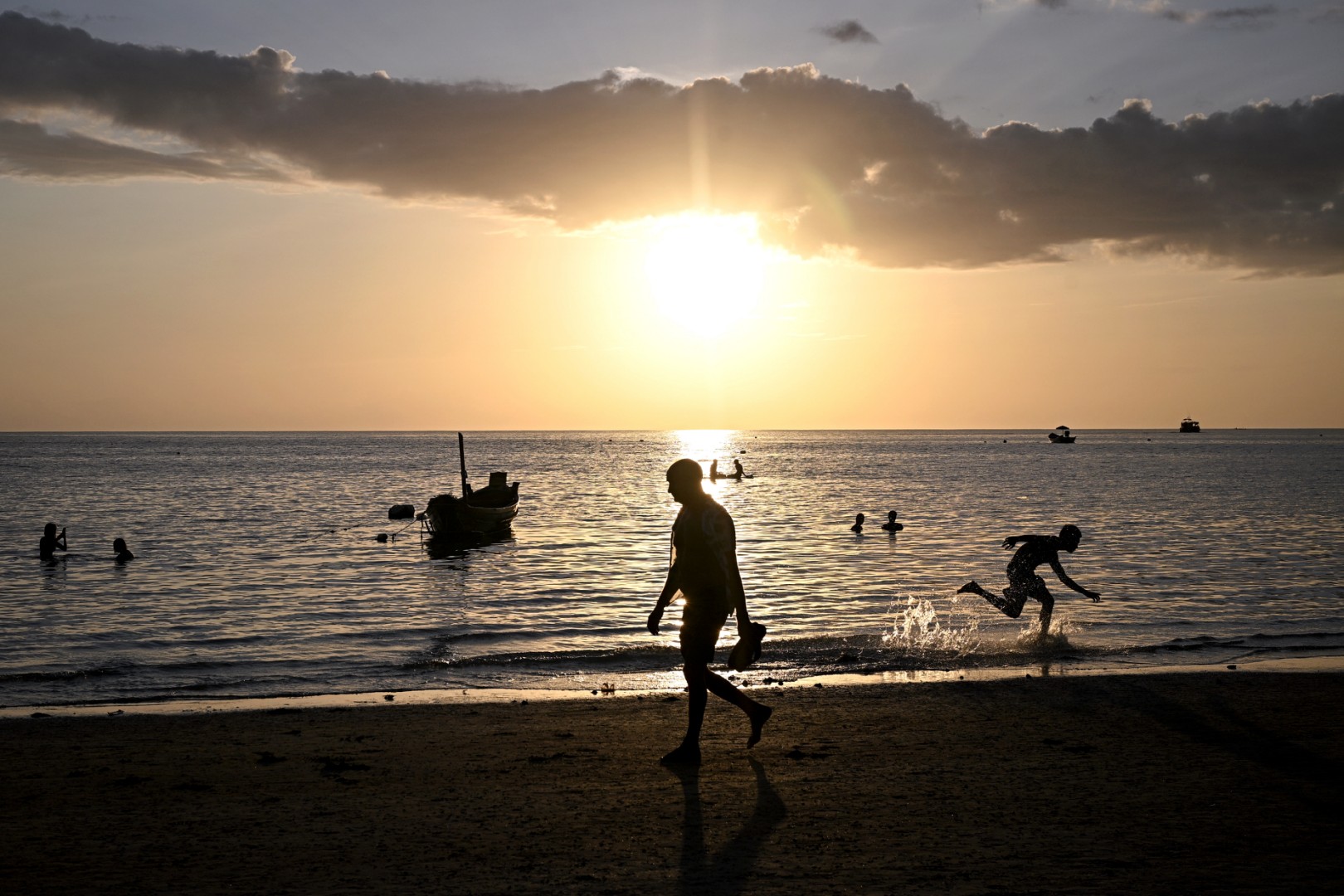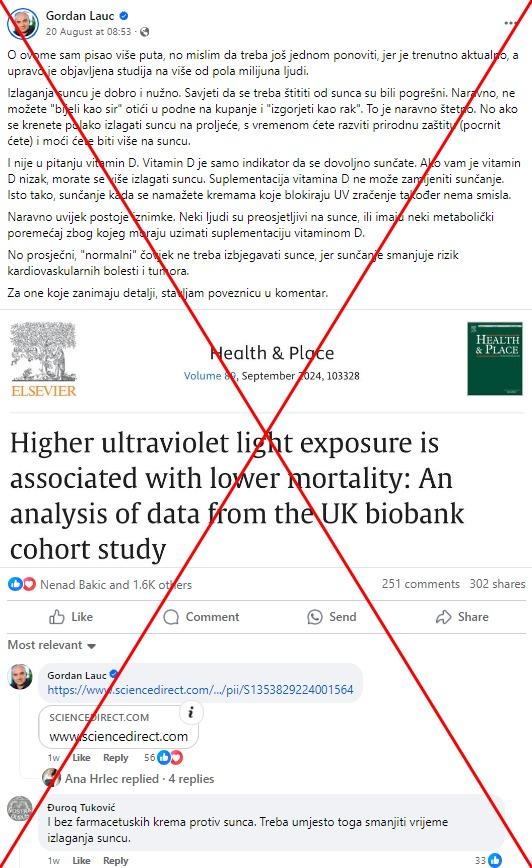
Study on benefits of sun exposure misinterpreted to claim sunscreen is 'pointless'
- Published on April 24, 2025 at 17:44
- 6 min read
- By Ivan FISCHER, AFP Croatia
"Advice that one should keep away from the sun is wrong", said Croatian molecular biologist and entrepreneur Gordan Lauc in a Facebook post on August 20, 2024 which he linked to a 2024 study on the possible benefits of higher ultraviolet light exposure.
Noting that people should not go swimming at noon if they are "white as cheese", Lauc said they should instead "gradually expose themselves to the sun during springtime," so they develop "natural protection (tan)". Lauc proceeded to claim that using UV-blocking sunscreens is "pointless".
His post soon gained traction and was shared more than 300 times within a week, with many commenters focusing on the "no sunscreen" advice. "No pharmaceutical sunscreens," wrote one of the users. "I never rub my skin with those chemicals," wrote another. "If only everyone read this and stopped buying the protection factor poisons," concluded one of the commenters.

However, most of Lauc's advice is wrong and potentially dangerous.
The authors of the study cited in the post told AFP that they did not know whether their data applies to "sunnier countries such as Greece", and that their study does not suggest people should not use sunscreen.
A dermatologist told AFP that tan does not reduce skin damage and cancer risk, and that sunscreen should be used daily on all exposed parts of the skin, even in winter months.
Sunrays are dangerous
The Sun emits three main types of electromagnetic radiation that reach the surface of the Earth -- visible light, infrared light and ultraviolet light.
More than half of this radiation is in the infrared spectrum, which heats the atmosphere and the surface.
The infrared and visible light are both types of non-ionizing radiation which does not cause molecular and cellular damage to our bodies. However, about five per cent of the sun's radiation reaching the surface is ultraviolet light, which has enough energy to damage molecules in our cells.
One in every three cancers diagnosed is skin cancer, and exposure to ultraviolet light has been identified as the main factor contributing to their development (archived here). According to WHO, overexposure to ultraviolet light may result in acute and chronic health effects on the skin, eyes and the immune system.
After assessing more than 1000 scientific studies, the International Agency for Research on Cancer (IARC) has concluded that solar radiation is carcinogenic to humans, causing malignant melanoma and nonmelanocytic skin cancer (archived here).
Other than causing cancer, exposure to sunshine can cause premature aging of the skin (archived here), as well as damage to the eyes (archived here).
"It is certainly very important to watch the method and time of sun exposure due to the risks that excessive sunbathing can bring", said dermatologist Snjezana Kramaric from the Bagatin clinic on August 28, 2024. "In addition to possible appearance of burns, followed by hyperpigmentation, long-term exposure to the sun without adequate protection significantly increases the risk of developing skin cancer."
According to the Croatian Public Health Authority (HZJZ), "the best way to protect skin health is to limit the time exposed to the Sun." In its 2024 recommendations (archived here), the HZJZ proposes to limit the time spent in the sunlight and avoid outdoors between 10 and 17 hours. If this is not possible, HZJZ recommends covering the skin with clothes, wearing a wide-brim hat, sunglasses and using sunscreen.
Study was misinterpreted
The scientific study Lauc linked in his post, titled "Higher ultraviolet light exposure is associated with lower mortality: An analysis of data from the UK biobank cohort study" was published in the September issue of Health and Place journal (archived link here). According to the study, "evidence suggests benefits of ultraviolet (UV) exposure for several health outcomes."
The researchers looked at data in the UK Biobank database (archived here) -- a large-scale biomedical research database that contains genetic, lifestyle and health information and biological samples from about half a million UK participants.
They looked at the correlation between UV exposure for participants of white European ancestry and their mortality outcomes and found a possible link between UV exposure and lower mortality in several categories. According to the study highlights, the researchers found that "evidence suggests benefits of ultraviolet (UV) exposure for several health outcomes."
However, the study concluded that further research was needed into the optimal level of UV exposure.
According to Professor Richard Weller from the University of Edinburgh, one of the study's authors, the findings do not suggest people should not use sunscreen. "We didn’t look at sunscreen use so cannot comment on this," said Weller on August 22, 2024. "However, sunburn - which sunscreen can reduce - is associated with an increased risk of melanoma."
Weller also explained that the available data is only applicable to the population of the UK, which receives less sunlight than lower latitude countries. "We looked at two measures which would give a broad indication of differences in relative sunshine people received," said Weller. "With both measures, we found people in the UK who received more sunshine tended to have less heart disease and cancer and live longer. We do not know whether our data applies to sunnier countries such as Greece."
Current expert guidance in the UK, as provided by both the National Health Service (NHS) and the Cancer Research UK non-profit, also recommends using plenty of SPF 30+ sunscreen, covering as much of one's body in clothes as possible, staying in the shade and avoiding the sun completely during peak hours.
Tan cannot replace sunscreen
According to the Skin Cancer Foundation, tanning is "the opposite of healthy" (archived here). While often associated with good health, a tan is evidence of DNA injury to your skin. "Tanning damages your skin cells and speeds up visible signs of aging," the foundation stresses.
Multiple studies have looked at the protection from UV rays provided by having tanned skin, and found that it is equivalent to having a Sun Protection Factor (SPF) sunscreen of 3 to 4. On its "Sun Safety" FAQ page (archived here), Johns Hopkins Medicine warns that "tanning does not prevent skin cancer".
HZJZ recommends using at least SPF 15 sunscreen in generous quantities, "most often more generous than the quantity one assumes is enough". Children should use SPF of at least 50, and sunscreen should be reapplied every two hours to retain its protection. The American Academy of Dermatology Association (AAD) recommends using SPF of at least 30.
"Many people think they're safe and protected from the sun's harmful effects once their skin darkens, so they stop using sunscreen and start spending more time in the sun," said Kramarić. "Darker tan can protect us from developing burns but does not reduce the risk of skin damage and developing skin cancer. Even if you have naturally darker skin or it has darkened in the sun, it is still important to use sunscreen, wear appropriate clothing, and completely avoid sun exposure between 11 and 16h."
All experts stress sunscreen should be used year-long. "UV radiation is present during the entire year, even if it is cloudy," said Kramarić. "Dermatologists recommend everyday use of sunscreen on all exposed parts of the skin -- such as your face, neck and arms. Even during winter months, the sun's rays damage the skin."
History of sharing health misinformation
As a respected molecular biologist at the time, Lauc was appointed as one of the government's advisors at the start of the Covid-19 pandemic in Croatia, when he was initially warning the public about the dangers of the disease.
However, he later became one of the most prominent public critics of Covid-19 vaccines and measures against the disease. He was removed from the government panel in November 2021 (archived here) after he called on citizens to publicly protest against Covid-19 certificates and accused the government of imitating the late Yugoslav dictator Josip Broz Tito by "prescribing how people should stay healthy."
On social media and in public, Lauc has since made numerous false and misleading claims about Covid-19 and vaccines, which have been debunked by AFP and the Croatian fact-checking website Faktograf, for example here and here (archived here and here).
AFP previously tackled other claims related to the effect of the sun on our health in Serbian and English.
Copyright © AFP 2017-2026. Any commercial use of this content requires a subscription. Click here to find out more.
Is there content that you would like AFP to fact-check? Get in touch.
Contact us
